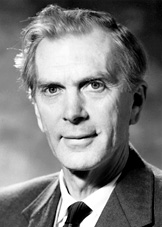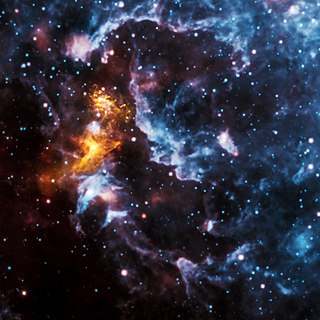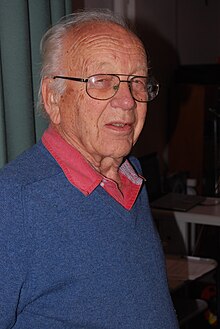
Jodrell Bank Observatory in Cheshire, England hosts a number of radio telescopes as part of the Jodrell Bank Centre for Astrophysics at the University of Manchester. The observatory was established in 1945 by Bernard Lovell, a radio astronomer at the university, to investigate cosmic rays after his work on radar in the Second World War. It has since played an important role in the research of meteoroids, quasars, pulsars, masers, and gravitational lenses, and was heavily involved with the tracking of space probes at the start of the Space Age.

Antony Hewish was a British radio astronomer who won the Nobel Prize for Physics in 1974 for his role in the discovery of pulsars. He was also awarded the Eddington Medal of the Royal Astronomical Society in 1969.

Sir Alfred Charles Bernard Lovell was an English physicist and radio astronomer. He was the first director of Jodrell Bank Observatory, from 1945 to 1980.

Sir Martin Ryle was an English radio astronomer who developed revolutionary radio telescope systems and used them for accurate location and imaging of weak radio sources. In 1946 Ryle and Derek Vonberg were the first people to publish interferometric astronomical measurements at radio wavelengths. With improved equipment, Ryle observed the most distant known galaxies in the universe at that time. He was the first Professor of Radio Astronomy in the University of Cambridge and founding director of the Mullard Radio Astronomy Observatory. He was the twelfth Astronomer Royal from 1972 to 1982. Ryle and Antony Hewish shared the Nobel Prize for Physics in 1974, the first Nobel prize awarded in recognition of astronomical research. In the 1970s, Ryle turned the greater part of his attention from astronomy to social and political issues which he considered to be more urgent.
Dennis Walsh was an English astronomer. He was an early radio astronomer, as well as an optical astronomer. He was best known for his discovery in 1979 of the first example of a gravitational lens, B0957+561, using an optical telescope.
PSR B1257+12, previously designated PSR 1257+12, alternatively designated PSR J1300+1240, is a millisecond pulsar, 2,300 light-years from the Sun, in the constellation Virgo, rotating at about 161 times per second. It is also named Lich, after a powerful, fictional undead creature.

PSR B1919+21 is a pulsar with a period of 1.3373 seconds and a pulse width of 0.04 seconds. Discovered by Jocelyn Bell Burnell on 28 November 1967, it is the first discovered radio pulsar. The power and regularity of the signals were briefly thought to resemble an extraterrestrial beacon, leading the source to be nicknamed LGM, later LGM-1.

A pulsar is a highly magnetized rotating neutron star that emits beams of electromagnetic radiation out of its magnetic poles. This radiation can be observed only when a beam of emission is pointing toward Earth, and is responsible for the pulsed appearance of emission. Neutron stars are very dense and have short, regular rotational periods. This produces a very precise interval between pulses that ranges from milliseconds to seconds for an individual pulsar. Pulsars are one of the candidates for the source of ultra-high-energy cosmic rays.

Andrew Geoffrey Lyne is a British physicist. Lyne is Langworthy Professor of Physics in the School of Physics and Astronomy, University of Manchester, as well as an ex-director of the Jodrell Bank Observatory. Despite retiring in 2007 he remains an active researcher within the Jodrell Bank Pulsar Group. Lyne writes that he is "mostly interested in finding and understanding radio pulsars in all their various forms and with their various companions. Presently, I am most occupied with the development of new multibeam search systems at Jodrell and Parkes, in order to probe deeper into the Galaxy, particularly for millisecond pulsars, young pulsars and any that might be in binary systems."
The Cavendish Astrophysics Group is based at the Cavendish Laboratory at the University of Cambridge. The group operates all of the telescopes at the Mullard Radio Astronomy Observatory except for the 32m MERLIN telescope, which is operated by Jodrell Bank.

Leon Mestel was a British-Australian astronomer and astrophysicist and Emeritus Professor at the University of Sussex. His research interests were in the areas of star formation and structure, especially stellar magnetism and astrophysical magnetohydrodynamics. He was awarded both the Eddington Medal (1993) and the Gold Medal of the Royal Astronomical Society. Following his retirement, he wrote several obituaries and biographical articles on physicists and astrophysicists.
This is a timeline of Jodrell Bank Observatory.

Rodney Deane Davies CBE FRS was a Professor of Radio Astronomy at the University of Manchester. He was the President of the Royal Astronomical Society in 1987–1989, and the Director of Jodrell Bank Observatory in 1988–97. He is best known for his research on the Cosmic microwave background and the 21cm line.

The Department of Physics and Astronomy at the University of Manchester is one of the largest and most active physics departments in the UK, taking around 250 new undergraduates and 50 postgraduates each year, and employing more than 80 members of academic staff and over 100 research fellows and associates. The department is based on two sites: the Schuster Laboratory on Brunswick Street and the Jodrell Bank Centre for Astrophysics in Cheshire, international headquarters of the Square Kilometre Array (SKA).

PSR B1257+12 b, alternatively designated PSR B1257+12 A, also named Draugr, is an extrasolar planet approximately 2,300 light-years (710 pc) away in the constellation of Virgo. The planet is the innermost object orbiting the pulsar Lich, making it a pulsar planet in the dead stellar system. It is about twice as massive as the Moon, and is listed as the least massive planet known, including among the planets in the Solar System.
Marek Janusz Kukula is a British astronomer and an author of works on popular science. After gaining a PhD in radio astronomy from the University of Manchester in 1994, he specialised in studying distant galaxies. As his research reached the limits of telescopes, he moved into the field of public engagement. In 2008 he was appointed Public Astronomer at the Royal Observatory Greenwich.

Ian Morison FRAS was a British astronomer and astrophysicist who served as the 35th Gresham Professor of Astronomy.

The Jodcast is a monthly podcast created by astronomers at Jodrell Bank Centre for Astrophysics (JBCA), University of Manchester in Manchester, England. It debuted in January 2006, aiming to inspire and inform the public about astronomy and related sciences, to excite young people with the latest astronomy research results, to motivate students to pursue careers in science, and to dispel stereotypes of scientists as incomprehensible and unapproachable.

Ingrid Stairs is a Canadian astronomer currently based at the University of British Columbia. She studies pulsars and their companions as a way to study binary pulsar evolution, pulsar instrumentation and polarimetry, and Fast Radio Bursts (FRBs). She was awarded the 2017 Rutherford Memorial Medal for physics of the Royal Society of Canada, and was elected as a Fellow of the American Physical Society in 2018.

Duncan Ross Lorimer is a British-born American astrophysicist. He is a professor of physics and astronomy at West Virginia University, known for the discovery of the first fast radio burst in 2007.















